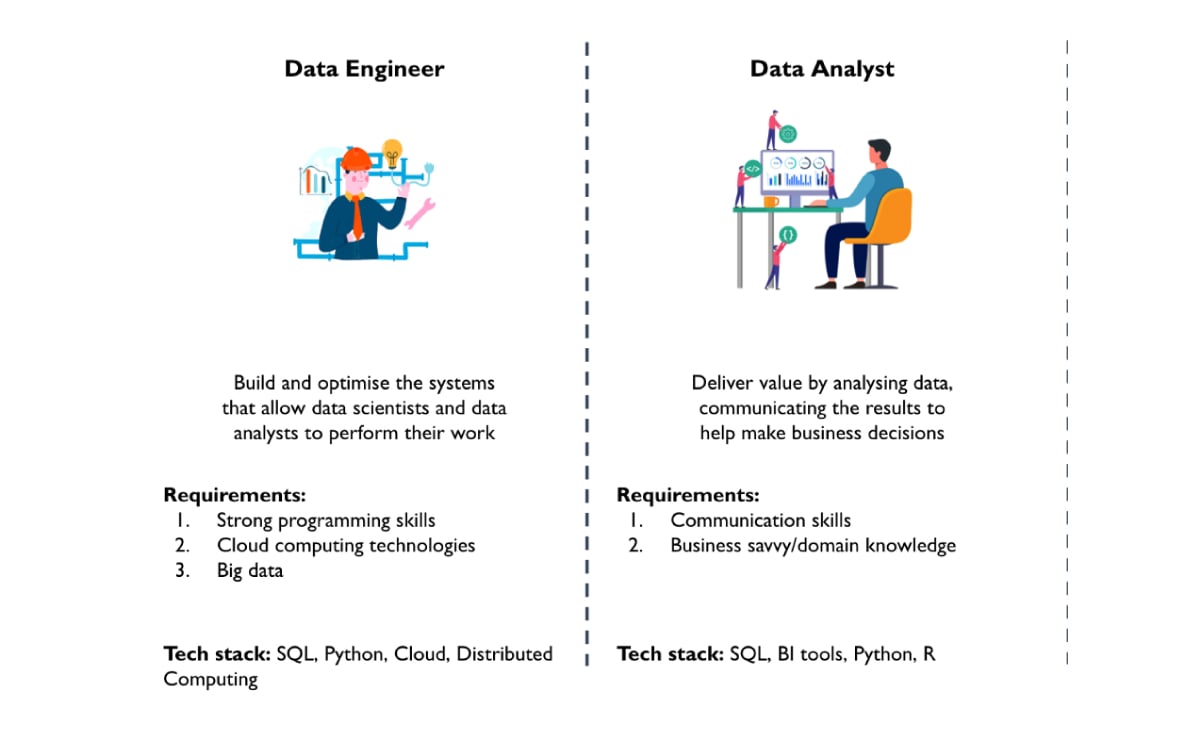
Data Analyst vs. Data Engineer: What's the Difference?
In today's world of information and technology, data plays a crucial role in decision-making, consequently affecting businesses' growth. However, the increasing amount of data generated daily requires sophisticated technologies to obtain valuable insights.
This is where data analysts and engineers come in, providing businesses with the necessary means to convert raw data into meaningful, actionable insights. In this blog post, we will explore the differences between data analysts and data engineers and how they contribute to the field of data science.
Differences between Data Analysts and Data Engineers
The primary difference between a data analyst and a data engineer is that data analysts focus on analyzing data. In contrast, data engineers are responsible for data collection, storage, and management. Data analysts use their analytical skills to interpret data and transform it into insights that inform business decisions. On the other hand, data engineers work with data architects to develop databases for data storage, build efficient and reliable data pipelines, and maintain data quality.
The roles of data analysts and data engineers are often interconnected as they both work towards the same goal - to make sense of raw data and uncover valuable insights. Data analysts use the processed data data engineers provide to generate useful reports. In contrast, data engineers rely on the insights from the analysis conducted by data analysts to optimize their processes and pipelines.

Data Analysts
Data analysts work on a wide range of data-related projects, starting from data collection, cleaning, and analyzing large sets of data. They primarily work with databases, spreadsheets, statistical software, and programming languages (e.g., R or Python) to implement data analysis and visualization.
Data analysts are also responsible for producing reports highlighting useful insights from their data analysis to inform business decisions. They are usually employed in various organizations and work under the supervision of a data scientist or an analytics manager.
For marketing, a Data Analyst might be responsible for analyzing customer data, understanding user behavior, and identifying areas of improvement to optimize the marketing funnel and its performance.
Data Engineers
Data engineers build data processing systems and pipelines that enable the efficient storage and movement of large amounts of data between different applications. Unlike data analysts, who focus on understanding the data itself, data engineers are more concerned with how to store, process, and move data.
Data engineers usually develop software products that automate data-related tasks and develop ETL (Extract, Transform, Load) processes to extract data from different sources and transform it into a format suitable for further analysis or storage. Data engineers also design and maintain databases such as SQL and NoSQL databases.
For marketing, Data Engineers can create pipelines to extract data from online sources like web analytics platforms, social media platforms, CR, etc. They can also enable applications to access data stored in a warehouse for analysis, monitoring, and reporting purposes.
Skills Required
Data Analysts and Data Engineers possess different skill sets to excel. Data Analysts need to have some knowledge of data visualization and statistical programming languages like R or Python. Also, they must be detail-oriented, analytical, and passionate about interpreting data to generate insights.
On the other hand, data engineers must be proficient in programming languages like SQL, Python, and Java. They must also possess skills in data modeling, cloud computing, and big-data technologies to design, develop, and execute efficient and scalable data pipelines.

Data Analyst and Data Engineer is indispensable
Data analysts and engineers have become indispensable in data science, with companies seeking data-driven solutions to improve their business growth. While both roles contribute to the same objective of providing meaningful insights from data, they require different skill sets to execute their respective tasks seamlessly.
Thus, companies must find the right balance between data analysts and engineers to implement a successful data management strategy. Whether you're a data analyst or data engineer or interested in pursuing either role, it is essential to keep learning and sharpening your skills to stay relevant in the ever-evolving field of data science.
With the right attitude and aptitude, you can be successful in either role and help your company leverage data for better business performance.
How Marketers Can Get Hired Fast
This Collective will personally match talented marketers with data acumen to high-growth, high-upside opportunities at some of the most exciting companies.
Join & Get HiredZoomMetrix Newsletter
Join the newsletter to receive the latest updates in your inbox.